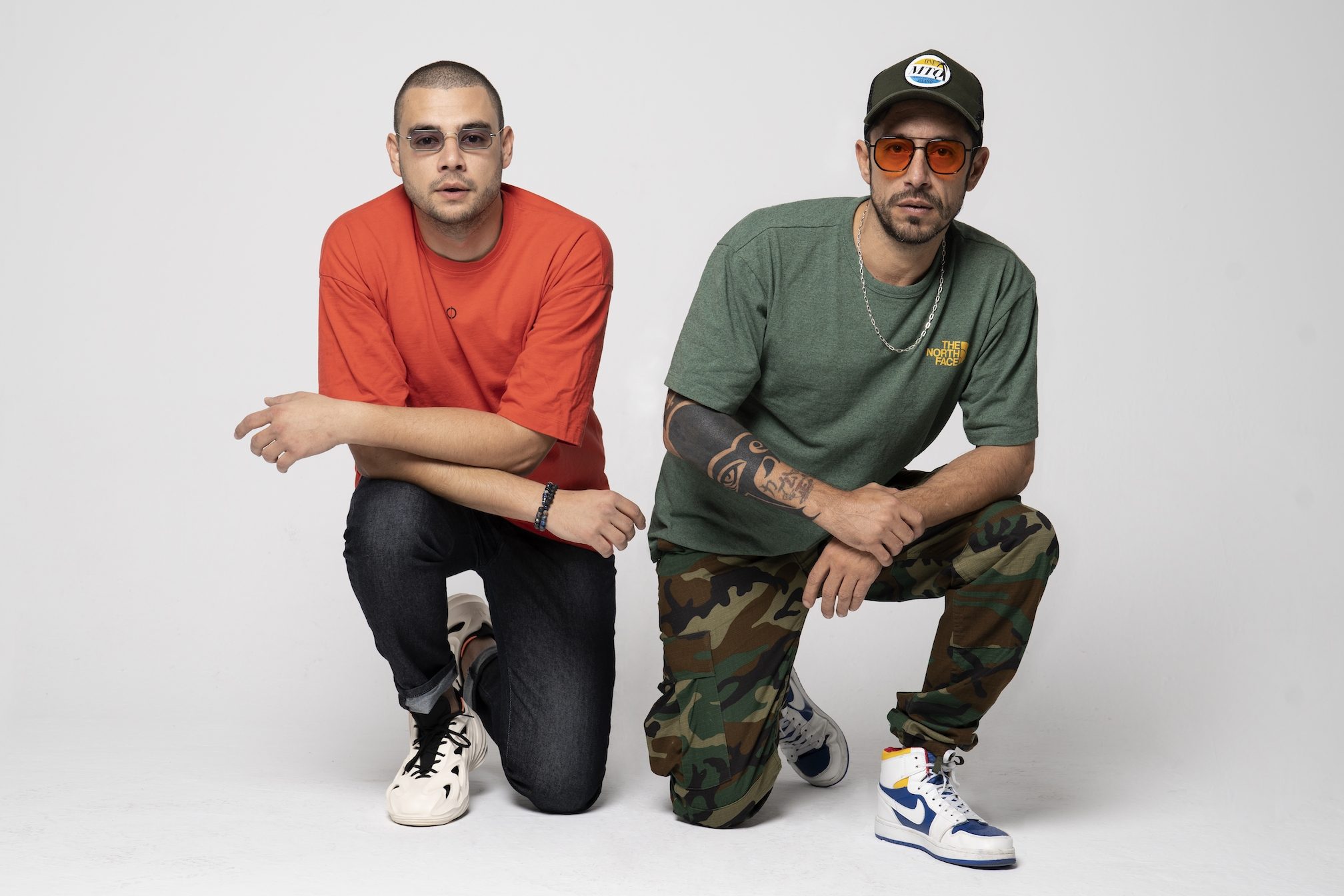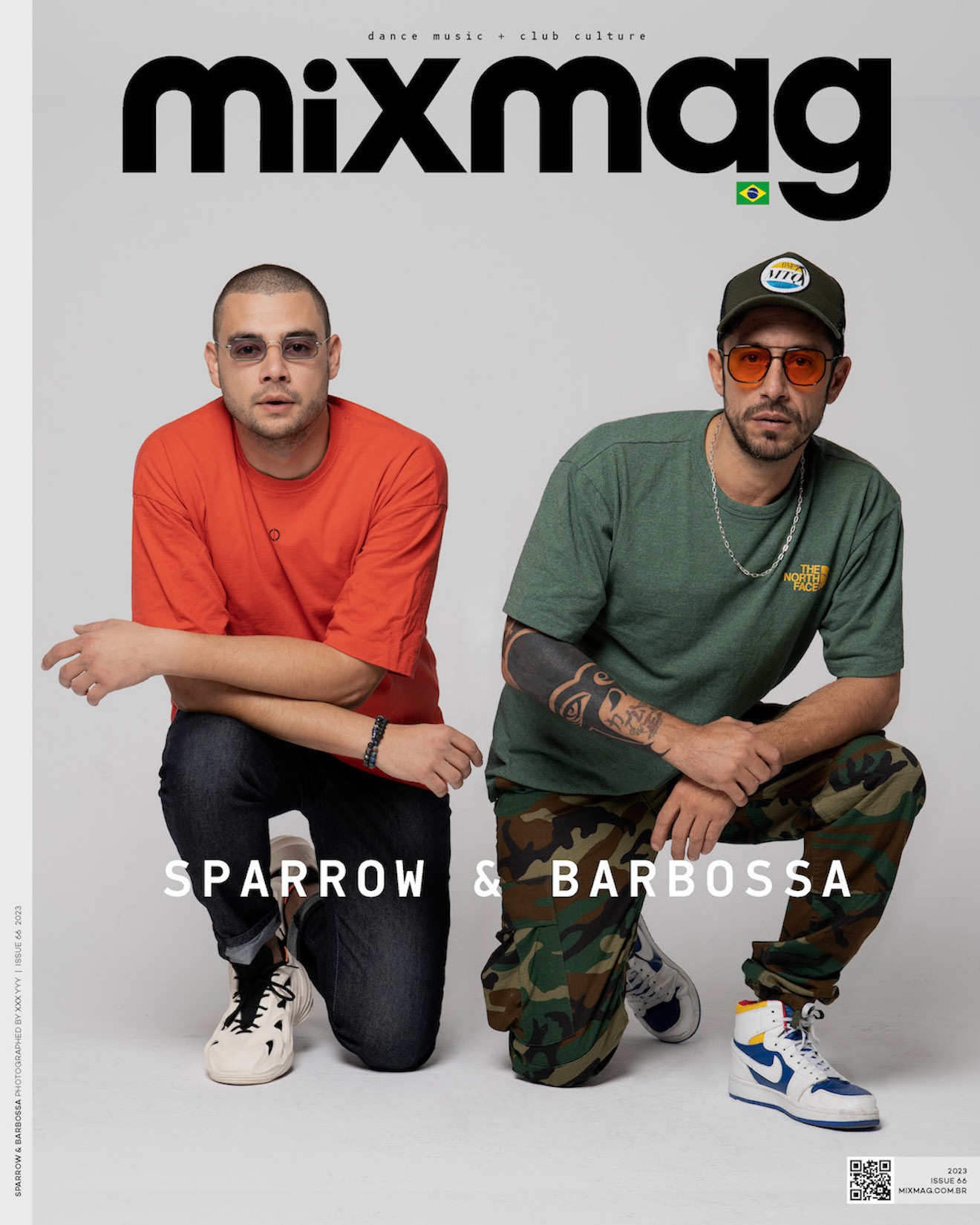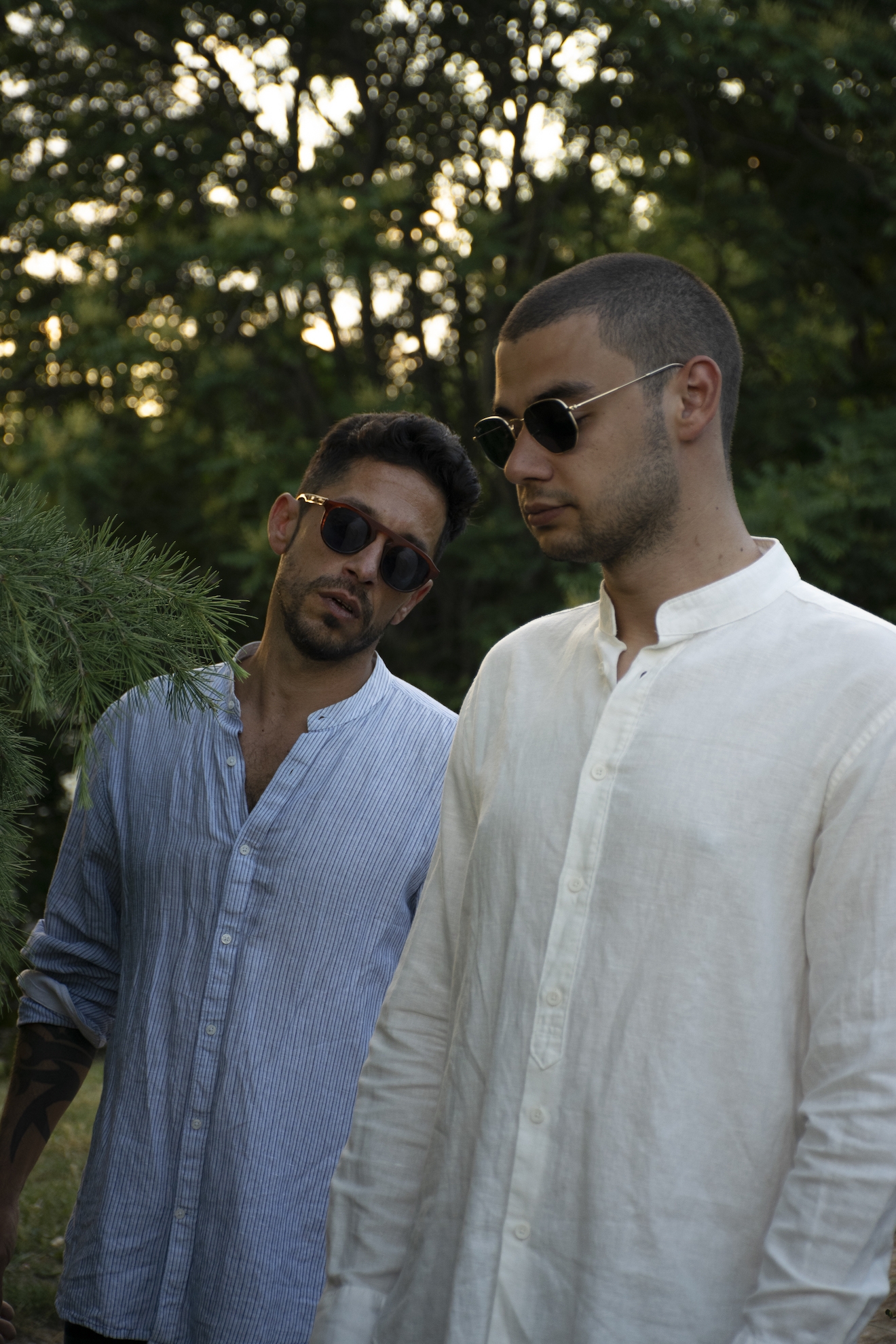 Cover Story
Cover Story
Sparrow & Barbossa: An Eclectic and Electronic Fusion of Sounds and Cultures
Transcending boundaries with Sparrow & Barbossa's genre-defying music. Read an exclusive interview!
In the dynamic world of music, where genres blend and boundaries dissolve, the duo known as Sparrow & Barbossa emerges as a vibrant force of creativity.
Comprising two talented musicians, their unique sound is a fusion of tribal beats, progressive rhythms, and a myriad of other influences that defy categorization.
In an exclusive interview, Sparrow & Barbossa delve into their musical journey, sharing insights into their formation, creative process, and their unwavering commitment to authenticity.
The duo’s musical prowess stems from their diverse backgrounds. Sparrow hails from a family of musicians. Immersed in the Swiss deep house and melodic house scene, Sparrow’s evolution as an artist is marked by his African and Moroccan heritage. Barbossa, on the other hand, is a seasoned drummer and percussionist deeply influenced by Latin culture and salsa.
With over two decades of experience in DJing organic house music, he brings a rich and rhythmic foundation to their collaborative efforts. It is through this symbiotic fusion that Sparrow & Barbossa’s unique sound came to life.
Their creative process is a testament to their adaptability and remote collaboration. In the whirlwind of touring and the post-COVID era, they have honed their ability to exchange ideas across distances, embracing the freedom technology provides.
Whether it’s a voice note humming a melody or a recorded piano riff, the duo thrives on the exchange of musical concepts, both within their partnership and in collaborations with other artists.
Known for their infectious energy and vibrant performances, Sparrow & Barbossa seamlessly translate that same enthusiasm into their studio recordings. Their inspiration is fueled by the profound emotions and experiences gathered from touring worldwide. The magic lies in the connection they forge with their audience and the transformative power of music.
As the global music scene continues to be shaped by electronic music, Sparrow & Barbossa stand apart from the crowd. Unwilling to conform to trends or imitate other artists, they proudly craft their music from scratch, involving musicians from around the world.
Their genre-defying sound defies classification, and they wholeheartedly embrace their distinct identity. Through their imprint, they alto strive to provide a platform for Caribbean talent, giving them a voice and fostering a sense of community.
Reflecting on their journey, Sparrow & Barbossa hold dear the memories of performing in Costa Rica, Panama, and Venezuela, where the crowds exude unparalleled energy and love. These territories have become their strongholds, where their music resonates most profoundly.
With a deep appreciation for cultural diversity, Sparrow & Barbossa approach their incorporation of various influences with respect and authenticity. Their personal backgrounds, enriched by African and Latin heritage, equip them with a profound understanding of these cultures. They often collaborate with artists from the ethnicities they seek to honor, combining their experiences to create something relevant and true.
Mixmag Brazil spoke with the duo about everything and, also, about Réciprocité, their latest album, just released on Orianna Music, a part of the Sony Music Latin. Read on to learn more!

“We think what sets us apart is that it is really impossible to classify us within a genre...”
Hey guys, thanks for the opportunity! How did the two of you come together to form the musical duo Sparrow & Barbossa? Can you share the story behind the name?
We met about 8 years ago when Sparrow moved to Madrid through friends we knew in common in the music industry from Switzerland we had both worked with in the past.
At that time the latest instalment of the infamous movie had just come out and Barbossa’s great resemblance with the great “Hector Barbosa” deeply inspired us into the naming.
Funnily enough Caribbean House is the genre we play the most and it’s what people most assimilate us to nowadays.
Your music is a unique blend of various genres like tribal, progressive & more. What inspired you to explore this eclectic fusion of sounds?
We are both musicians but with different backgrounds. While Sparrow comes from a musical family and has African / Moroccan roots, his Dad actually played with Frank Sinatra, Elton John, Whitney Houston and Quincey Jones amongst others. He played piano since a very young age until he started evolving in the Swiss deep house and melodic house scene.
On the other hand, Barbossa has been playing the drums and percussion all his life. He has been inspired vastly by salsa and latin culture and has been DJing more organic house music for over 20 years. The fusion really happened when we got together.
As artists who frequently collaborate with other musicians, how do you approach the creative process? Can you take us through the typical journey of creating a Sparrow & Barbossa track?
In this hectic work of touring and the post-COVID era I think we really learned to be completely remote in the creative process, even within the duo.
Sometimes Barbossa would send a voice note humming some stuff he heard, sometimes Sparrow would just record a piano riff on his laptop.
There’s no clear blueprint on how it’s done, but it’s always about exchanging ideas, and the same applies to external collaborations.
Your performances are known for their infectious energy and vibrant atmosphere. How do you manage to bring that same level of enthusiasm to your studio recordings?
Performances are usually what fuel us and inspire us into the creation process.
We really love this feeling of coming back from a tour in 5-10 countries, full of incredible emotions and motivation. This is what makes the magic.

“We are both musicians but with different backgrounds... The fusion really happened when we got together.”
The global music scene has been heavily influenced by electronic music in recent years. How do you see the future of this landscape, and what do you think sets you apart from other artists?
The evolution has been exponential in the ecosystem indeed. We think what sets us apart is that it is really impossible to classify us within a genre. We have our own sound and never chase to sound like any other successful artist.
Sadly nowadays most of top 100 charts all sound alike because of various things: people try too hard to sound like others do, and then of course ghost production doesn’t help this phenomenon neither.
We proudly produce every single piece of music of ours from scratch, involving musicians from all around the world and we will keep on doing so forever. A genre we truly believe in is Caribbean House, which is why we created our label Tortuga.
We truly think Caribbean House is going to become the new Afro House in the upcoming years and this is the reason why we are so committed to give a voice to every single talent in the Caribbean through our imprint.
Sparrow & Barbossa have performed in various countries and festivals around the world. Is there a particular show or venue that holds a special place in your hearts? What made it so memorable?
So far Costa Rica, Panama and Venezuela have been our favorite crowds ever. The energy and love we have been receiving from these crowds is absolutely out of this world. They are also the territories where we have the biggest following.
Your music often incorporates cultural elements and instruments from different parts of the world. How do you ensure that you approach these influences respectfully and authentically in your compositions?
As we mentioned earlier in the interview both of us combine various ethnicities on the African and Latin side of the world, which gives us significant experience on how to approach these cultures.
When we decide to explore other soundscapes and ethnicities we often involve Francis Coletta, Sparrow’s dad in the productions. He has an incredible 50+ years career in music all around the world tributing and often inspired by artists ranging from Astor Piazolla in Buenos Aires, Ivan Lins in Brazil, Bireli Lagrene on the gypsy side, George Benson, Richard Bona and many more on the Jazz side.
Lastly, we almost always collaborate with artists from the ethnicities and cultures we try to transmit legacy from, so we would say that the combination of all of these aspects combined is what make us relevant and authentic.

“Performances are usually what fuel us and inspire us into the creation process. This is what makes the magic.”
In the age of streaming and digital platforms, how has the landscape of the music industry changed for you as independent artists? What opportunities and challenges have you encountered along the way?
The changes have been pretty drastic indeed but we think they also came at a great time during the confinement where people really relied on music to support their mental health.
During those complicated times is really when we realized we were getting hundreds of messages from people thanking us for being their relief companion. We even have some mental health professionals that have been contacting us and this is really when we decided to give a shift in the way we create music.
We decided to focus our first album “SEVEN SEAS” on LISTENING music, while also releasing remixes with a more dance floor perspective; and this is the same focus we have decided to give our new album.
The Réciprocité album just came out on Orianna Music, part of Sony Music Latin. What can you share about the making of such amazing project?
This one is very special to us and the same way that our first album was it involved Francis Coletta on almost every track of the album.
It features collaborations with artists such as Chico Castillo, Starving Yet Full (Ex Azari & III), Maria De Moraes (Daughter of the infamous Vinicius De Moraes, creator of bossa nova and ex culture minister of Brazil), Phindile Ndlovu (Lion King), Idd Azziz, G Zamora, Eribertho Cruz and Kaan Akalin amongst others.
It is once again a travel around the world, exploring cultures and genres such as Flamenco and Classic Music with a revival of the famous Bolero from Ravel, Salsa, Caribbean, Afro, Turkish and Amapiano. It sets the base of our new live performance that will also be part of our artist performance offering for the coming years.
Looking ahead, what can fans expect from Sparrow & Barbossa, are there any exciting collaborations or ventures on the works along the album that you can share with us?
One of the most anticipated Afro House tracks this year is our track “Champion” coming out on Rampa’s VOD imprint. It will be released in August.
Last: we always ask for advice for new talents hustling to get careers off the ground. Can you share some insights and tips for those guys trying to figure out to to stand out?
As we mentioned before in the interview, we truly think it is important to follow what your soul tells you to produce and not try to imitate music from other producers.
This may be a shortcut in the short term but it will not last the test of time time and will not make your music timeless.
Follow your gut. Even if you think your music will not be “commercial”, if it represents you there will always be people to enjoy it.
Sparrow & Barbossa, Eribertho Cruz - Bien Buena (Video Oficial)
Follow Sparrow & Barbossa on: Instagram | Facebook | Soundcloud
Photos: Divulgação Sparrow & Barbossa / Orianna Music


